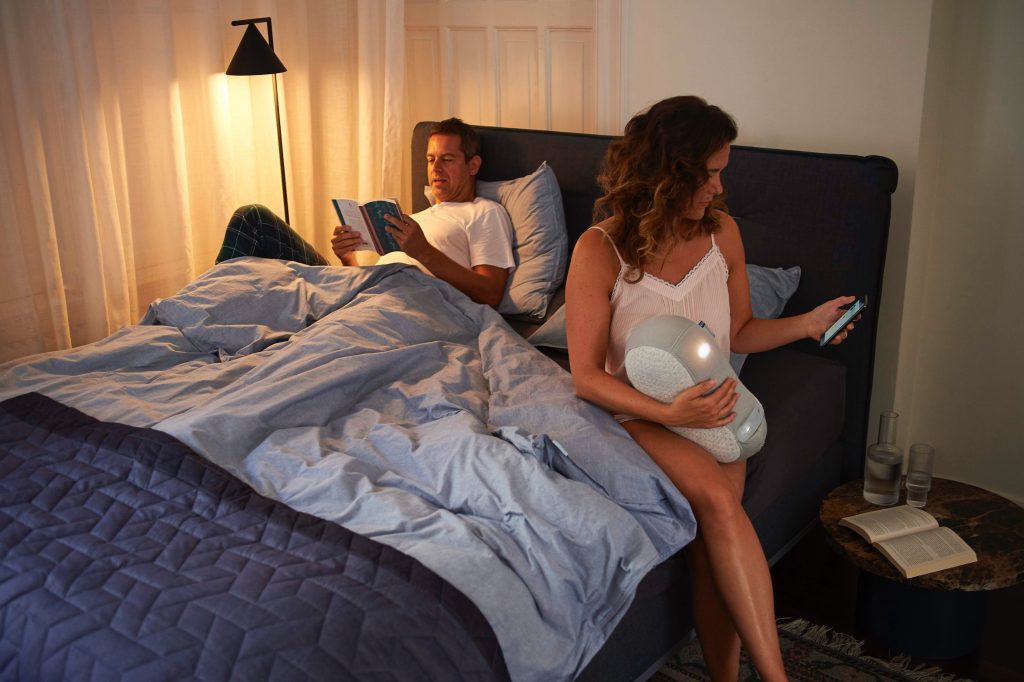Do you have trouble sleeping? Or ‘hitting the hay’? Well, guess what? You’re not alone.
Did you know that, on average, we spend almost 2 hours every night dreaming? Now, when you factor in the stresses of daily life, it’s easy to see why most of us have trouble falling asleep. Because sleep plays a critical role in our health, it makes sense to do everything possible to improve it. The trouble is when it comes to improving their sleep, most people don’t know where to start.
This article provides 5 easy-to-implement tips to put you one step closer to achieving a good night’s sleep.
What is sleep?

While sleeping, your brain cycles through two types of sleep: rapid eye movement (REM) and non-rapid-eye movement.
The first cycle is non-REM sleep, comprised of four stages.
-
The first stage happens just as we hop into bed.
-
The second stage is ‘light sleep’ and involves regulating our heart, breathing, and body temperature.
-
The third and final stage is deep sleep.
Previously researchers believed REM sleep was critical to getting a good night’s sleep. However, new research suggests that ‘non-REM’ sleep is vital and can even improve cognitive health tasks such as memory and learning.
Most people go through 4-5 cycles each night. However, as each sleep cycle passes, so does the amount of time you spend in the deep sleep stages.
Why is sleep so important?

Who hasn’t suffered from morning brain fog? Poor sleep can negatively impact our cognitive health and make concentrating and staying focused on work tasks difficult.
First, sleep allows us to process what we’ve learned during the day, which is why lack of sleep results in a foggy brain. Scientists also believe getting a good night’s sleep helps to rid “waste products” from the brain.
Perhaps the most important reason we need sleep is for our general health. When people suffer from a lack of sleep, it can seriously impact their health.
Some of the most common symptoms that stem from poor sleep are:
-
High blood pressure
-
Headaches
-
Mood swings
-
Depression
-
Weakened immunes system
Top five tips to improve your sleep

If poor sleep has become customary for you, these tips are a surefire way to improve your sleep and health. One of the first things you can do is track your sleep and note factors that negatively impact it, like eating dinner late at night or using your smartphone before bed.
Once you’ve actively tracked your sleep patterns over the course of a couple of weeks, it’s time to implement the 5 tips below.
1Reduce light and sound
The two most significant factors that can negatively impact your sleep are sound and light. A dark room, in particular, helps release melatonin, which has a relaxing and calming effect making it easier to sleep.
Blue light emitting from your phone is the biggest culprit, however, which is why it’s important to limit the time you spend on your phone or tablet before bed. Many researchers suggest leaving your phone in another room or turning it off altogether.
There’s nothing worse than hearing annoying sounds while trying to get to sleep. Two good ways to eliminate those sounds are using a fan or listening to white noise. Many free apps play white noise in the background, like rain on the roof or, my favourite, wind howling through the valley.
2Invest In good bedding
Considering the average adult spends almost one-third of their life sleeping, it makes sense to splurge on high-quality bedding accessories like a good mattress and pillow. Making your bedroom a relaxing place goes a long way toward improving sleep duration and quality.
 Source: ResearchGate
Source: ResearchGate Keeping your bedroom at a comfortable temperature can also aid in sleep quality, as can investing in some heavy curtains to block any unwanted light from outside sources.
3Get a sleep routine
Routines play an essential role in many areas of our lives. For instance, professional athletes use pre-game and pre-shot routines to ensure consistent peak performance. But routines are also important for getting a good night’s sleep.
The best thing about a sleep routine is there’s no ‘right’ or ‘wrong’ one. It’s just a matter of finding a routine that works for you. Whether reading a book, listening to music or practising breathing exercises, having a consistent routine can transform your sleep health.
4Manage your daily stress
Your ability or ‘inability’ to manage your stress can significantly impact your sleep duration and quality. While stress isn’t inherently bad, it can turn to anxiety, which can affect not only your sleep but your health too.
If you’re someone who has trouble dealing with stress, try some relaxation techniques like deep breathing before bed or enrol in a yoga class once or twice a week.
Remember, many of the problems we think are consequential really aren’t. Ask yourself, ‘will I be worried about this problem a week or a year from now?’ More often than not, the answer is no. In short, ‘Don’t sweat the small stuff.’
5Can’t sleep? Wake up
Many people find that once they get to bed, they can’t get to sleep. Worrying about the stresses of the day or an assignment with a due date looming can all play havoc with our minds.
Next time this happens, don’t be afraid to hop out of bed, head downstairs, and do something to help you relax. My favourite activity is performing some light stretches. For you, though, it might be reading a book, listening to music or even doing some cleaning.
Once you start to feel sleepy, head back to bed and try again. Hopefully, you don’t have to wake up too often.

Fun sleeping facts you might not know
-
Some people see their dreams in black and white.
-
Humans are the only mammals that can postpone or delay sleep.
-
Sleep is not the same for males and females.
-
Good sleep can strengthen your immune system.
-
Nearly 15% of people sleepwalk.
Let’s sum it up

As you can see, sleep, particularly sleep quality, plays a vital role in many areas of our lives, including reducing stress, boosting our immune system, and improving our cognitive ability.
By implementing the five tips outlined in this article, you should be one step closer to achieving that elusive good night’s sleep.
Recap of sleeping tips
1. Reduce light and sound
2. Invest in good bedding
3. Get a sleep routine
4. Manage your stress
5. Can’t sleep, wake up
Good luck and good night.








